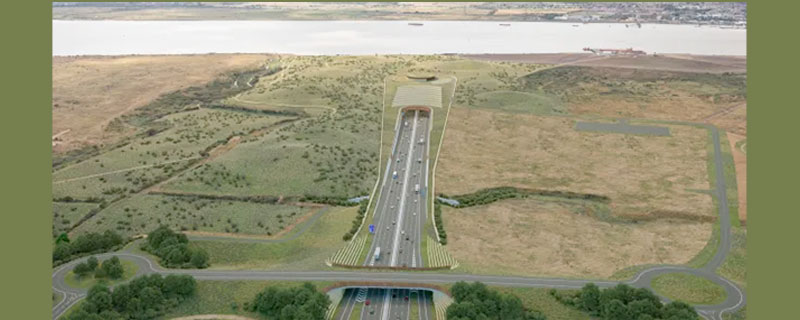Britain’s Infrastructure Barriers
An artist’s impression of the northern entrance to the proposed Lower Thames Crossing (Photo: Joas Souza)
Britain is lagging behind Europe on delivery of key infrastructure due to an “overly complex and slow” planning system, bureaucracy and a shortage of builders, a new report has warned.
Delays to building major roads, railway and energy projects will harm the economy, regional equality and the move to net zero, the study by the Council on Geostrategy think tank found.
The Government’s Planning and Infrastructure Bill and 10-year infrastructure strategy aims to streamline legislation surrounding critical major projects.
But ministers must “go even further” by enforcing strict deadlines for statutory consultations, international benchmarking to identify underperformance in the UK and supply audits of construction material for large-scale projects, the report said.
“Bold targets” for the transport network should include a high-speed rail line extending beyond Birmingham, ensuring Hull, Manchester, Liverpool, Leeds, Sheffield, Newcastle, Cardiff, Edinburgh and Glasgow are better connected.
Improving main trunk roads should also be priortised, its author Dr Mann Virdee, a senior research fellow in science, technology and economics, argued.
The Elizabeth Line on London’s Tube, finished four years late and £4bn over budget, and the Lower Thames Crossing, which is at least £3.5bn over budget, were among delayed major projects highlighted by the paper, titled “Road to nowhere: Britain’s infrastructure problem”.
Connecting Essex and Kent, the Lower Thames Crossing is Britain’s biggest road scheme, and was first proposed by the government 16 years ago.
But it has not yet begun construction, with its planning application almost 360,000 pages long.
Hinkley Point C, the UK’s first nuclear power station to be developed in more than 20 years, could be delayed by another four years until 2031, with rising construction material and labour costs due to Brexit blamed.
Big infrastructure projects require a Development Consent Order (DCO) from the government, but their approval time grew from 2.6 years in 2012 to 4.2 years in 2021.
The notorious £100m HS2 bat tunnel was among more than 8,200 consents required by the high-speed operator from public bodies.
Problems with HS2, which is now delayed beyond a target date of 2033, “exemplify the scale and extent of the challenge” of delivering large-scale infrastructure in the UK, the report said.
“At the same time, other countries are showing the scale of their infrastructure ambitions,” it added.
“Spain’s high-speed rail network is the longest in Europe at nearly 4,000km – the second longest in the world after China.”
Britain’s motorway system was also far behind leading nations across Europe, data compiled by the study showed.
In the UK, there is 3.3 miles (5.4km) of motorway per 100,000 people, way below Spain’s 22 miles (35.6km), Portugal’s 18 miles (29.4km), France’s 11 miles (17.4km), Germany’s 10 miles (15.8km) and Italy at 7 miles (11.9km).
Britain was also bottom of the table when it came to km of motorway per 100 sq km of land area, with just one mile (1.5km) – less than half of Germany, Spain and Portugal who all had more than two miles over the same area.
The UK has added only 65 miles (105km) of motorway in the last decade, according to government figures, putting it well behind other nations in Europe.
Extending motorways was one of the best ways to improve connectivity across regions as a country’s population grows, the report said.
But over the last 35 years, the UK added 420 miles (680 km) of motorway, the Financial Times has reported, a fraction of what other nations have managed, and a period which saw the population expand by 11 million.
“That is particularly important for countries such as the UK, which struggle to build other forms of transport, such as railways, in a cost-effective manner,” it added.
Another project delayed for decades is a third runway at Heathrow, which has faced numerous legal challenges over environmental issues.
Data shows that 58 per cent of all decisions on major infrastructure were subject to judicial review since 2012, compared to a historical average of around 10 per cent.
The Government should also push for near universal next-generation data connectivity, Dr Virdee said, with the UK ranked last among 15 leading economies for 5G, according to a recent report.
“Britain faces deeply entrenched barriers to delivering the infrastructure it needs for the 21st century,” he said.
“The planning system is a primary culprit, characterised by excessive complexity and bureaucracy.
“However, the challenges extend beyond planning – include policy instability and volatile funding, high industrial electricity costs and a shortage of construction workers.”
The barriers were interconnected and creating a “cycle of inertia” which is difficult to break, he added.
A government spokesperson said transport is an “essential part of our mission to rebuild Britain” and drive economic growth as part of its “Plan for Change”.
“That’s why we are taking decisive action to speed up the planning processes that will deliver the transport infrastructure we need, and our 10-year infrastructure strategy sets out a strategic approach so we can deliver the right infrastructure in the right place,” they added.
Projects under way included the TransPennine route upgrade would significantly improve connectivity between Manchester and Leeds, they said.
East West Rail would “unlock growth across the Oxford-Cambridge corridor”, while the Lower Thames Crossing would almost double road capacity across the River Thames east of London, the spokesperson added.
by Joe Duggan
Source: iNews






Leave a Reply
Want to join the discussion?Feel free to contribute!